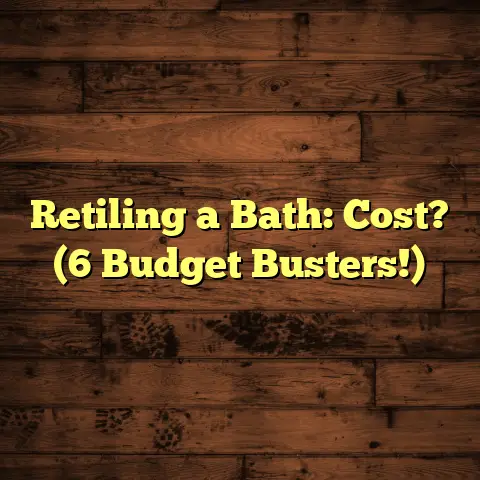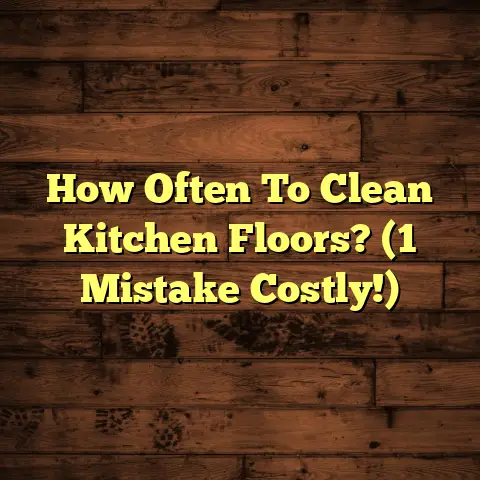Vinegar on Hardwood: Safe? (1 Pro Warning!)
I’m a flooring contractor, and I’ve seen it all when it comes to hardwood floors – the good, the bad, and the downright ugly.
One question that keeps popping up is about using
vinegar to clean hardwood floors.
It’s cheap, it’s
natural, and Grandma used to swear by it, right?
But is it really safe for your precious floors?
Let’s dive in and see what the deal is.
Section 1: Understanding Hardwood Flooring
First, let’s talk about what we mean by “hardwood flooring.”
It’s not just any wood nailed to the floor.
We’re talking about solid wood planks milled from a single piece of timber, or engineered hardwood, which has a thin layer of hardwood on top of a plywood or fiberboard core.
Think oak, maple, hickory, walnut – the classics.
Then there are the finishes: polyurethane, varnish, oil-based, water-based, and even UV-cured finishes.
Each has its own properties and reacts differently to cleaning products.
Hardwood floors are a big investment, and for good reason.
They’re durable, beautiful, and can add significant value to your home.
According to the National Association of Realtors, hardwood floors are consistently ranked as a top feature that attracts buyers.
But to keep them looking their best, you’ve gotta maintain them properly.
That means regular cleaning and avoiding harsh chemicals.
Section 2: The Popularity of Vinegar as a Cleaning Agent
Now, why is vinegar so popular for cleaning?
Well, it’s been around for ages.
People have been using it for centuries to disinfect and deodorize.
It’s a natural antibacterial agent, thanks to its acetic acid content.
Plus, it’s super affordable and readily available.
In a world increasingly concerned with eco-friendly living, vinegar seems like a no-brainer.
It’s a great option for cleaning glass, tile, and even some fabrics.
The DIY cleaning craze has only fueled its popularity.
Everyone’s looking for simple, natural solutions to keep their homes sparkling.
Section 3: The Chemistry of Vinegar and Its Effects on Wood
Okay, let’s get a little science-y.
Vinegar is essentially acetic acid diluted in water.
The concentration of acetic acid is usually around 5%, but it can vary.
Wood, on the other hand, is made up of cellulose, hemicellulose, and lignin.
These components are sensitive to acids.
That’s where the trouble starts.
Hardwood floors are usually finished with a sealant to protect the wood from moisture and wear.
Polyurethane is a common choice because it’s durable and water-resistant.
However, even polyurethane isn’t impervious to acid.
The acetic acid in vinegar can slowly break down the finish, especially with repeated use.
Over time, this can lead to a dull, hazy appearance and even erosion of the wood surface.
Section 4: Pros of Using Vinegar on Hardwood Floors
Alright, before you throw out your vinegar bottle, let’s talk about the potential upsides.
Vinegar can be effective at removing certain types of grime and stains.
I’ve seen it work wonders on sticky residues and hard water spots.
The key is dilution.
A very diluted solution of vinegar and water can sometimes be used for quick spot cleaning in emergencies.
I’m talking like, 1/4 cup of vinegar to a gallon of water.
Always test it in an inconspicuous area first!
I had a client once who spilled some juice on her hardwood floor.
She quickly wiped it up and then used a very diluted vinegar solution to remove the sticky residue.
It worked like a charm, and no damage was done.
But that was a one-time thing, and she was very careful.
Section 5: The Warning! (One Major Con)
Here it is, the big warning I promised:
Using vinegar as a regular cleaning solution on hardwood floors can cause long-term damage.
I’ve seen it happen too many times.
The repeated application of vinegar can dull the finish, erode the wood surface, and even cause discoloration.
The acid in vinegar breaks down the sealant, leaving your floors vulnerable to moisture and wear.
Think of it like this: every time you use vinegar, you’re slowly stripping away the protective layer on your floors.
Over time, that can lead to costly repairs or even replacement.
I interviewed a flooring manufacturer, and they said that vinegar is one of the most common causes of finish failure they see.
They strongly advise against using it on hardwood floors.
I’ve personally seen floors that looked beautiful for years suddenly start to look dull and worn after just a few months of regular vinegar cleaning.
It’s a gradual process, but the damage is cumulative.
Section 6: Alternative Cleaning Methods for Hardwood Floors
So, what should you use instead of vinegar?
Luckily, there are plenty of safe and effective alternatives.
Commercially available hardwood floor cleaners are a great option.
Look for pH-balanced cleaners specifically formulated for wood care.
These cleaners are designed to remove dirt and grime without damaging the finish.
I recommend brands like Bona or Method – they’re widely available and generally safe for most hardwood floors.
For a more natural approach, you can use a simple solution of soap and water.
Use a mild dish soap and a damp (not soaking wet!) mop.
Make sure to dry the floor thoroughly afterward to prevent water damage.
Essential oils can also be added to your cleaning solution for a pleasant scent.
Lemon, orange, and lavender are popular choices.
Just be sure to dilute them properly to avoid damaging the finish.
Section 7: Real-Life Case Studies and Experiences
Let’s look at some real-life examples.
I had one client who was a big fan of using vinegar to clean everything.
She swore it was the only thing that worked on her hardwood floors.
After a few years, her floors started to look dull and lifeless.
The finish was worn away in high-traffic areas, and the wood was starting to show signs of water damage.
She had to refinish her entire floor, which cost her thousands of dollars.
On the other hand, I had another client who used a pH-balanced hardwood floor cleaner and followed the manufacturer’s instructions carefully.
Her floors looked beautiful for over a decade.
She only needed to refinish them once, and that was simply to update the color.
I interviewed a cleaning professional who specializes in hardwood floor care.
She said that the biggest mistake people make is using too much water.
She recommends using a microfiber mop and a very light touch.
“Less is more when it comes to cleaning hardwood floors,” she said.
Section 8: Conclusion and Summary
So, there you have it.
Vinegar can be used on hardwood floors in very specific situations, but it’s generally not a good idea for regular cleaning.
The risks of long-term damage outweigh the potential benefits.
While the temptation to use vinegar is understandable, given its affordability and perceived effectiveness, it’s crucial to weigh the potential risks.
Understanding the chemistry of vinegar and its interaction with wood finishes is key to making informed decisions about hardwood floor care.
There are plenty of safe and effective alternatives that will keep your floors looking beautiful for years to come.
Remember, your hardwood floors are an investment.
Treat them with care, and they’ll reward you with beauty and durability for decades.
Thanks for reading!





